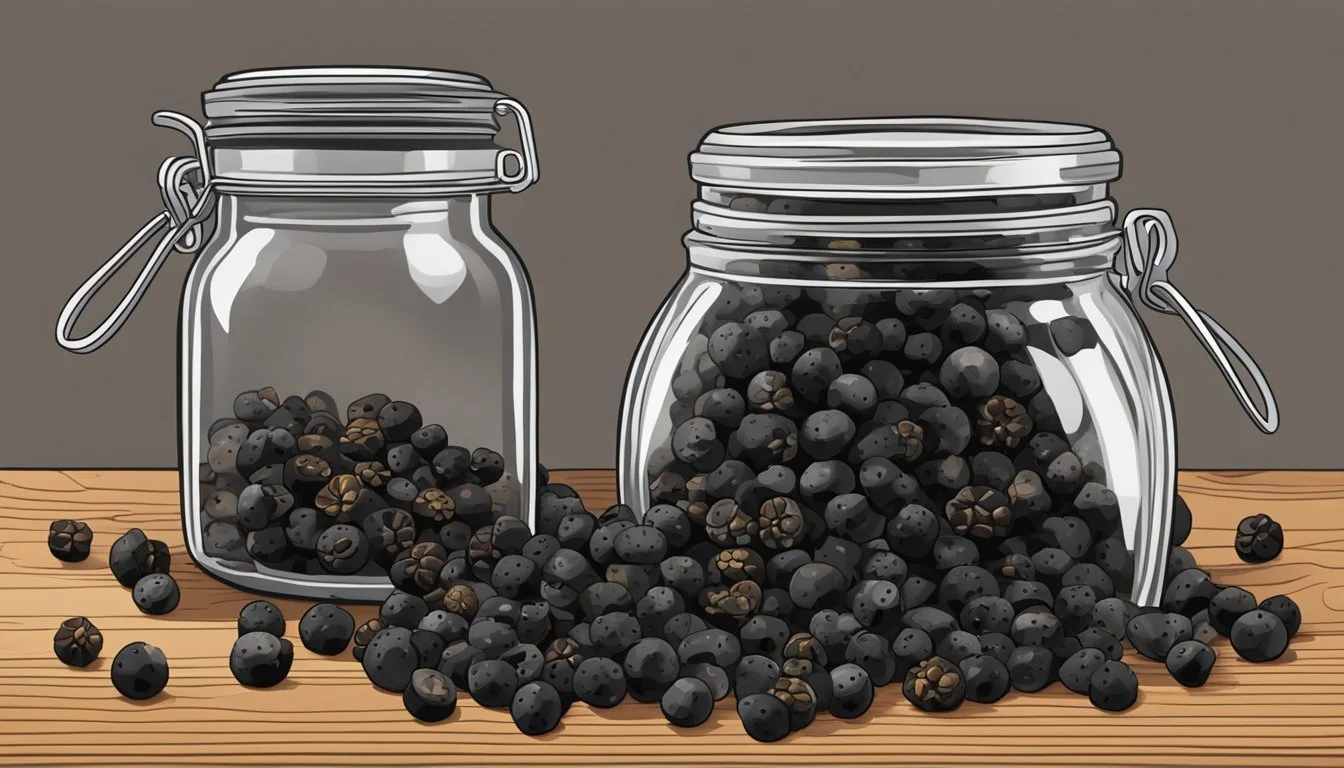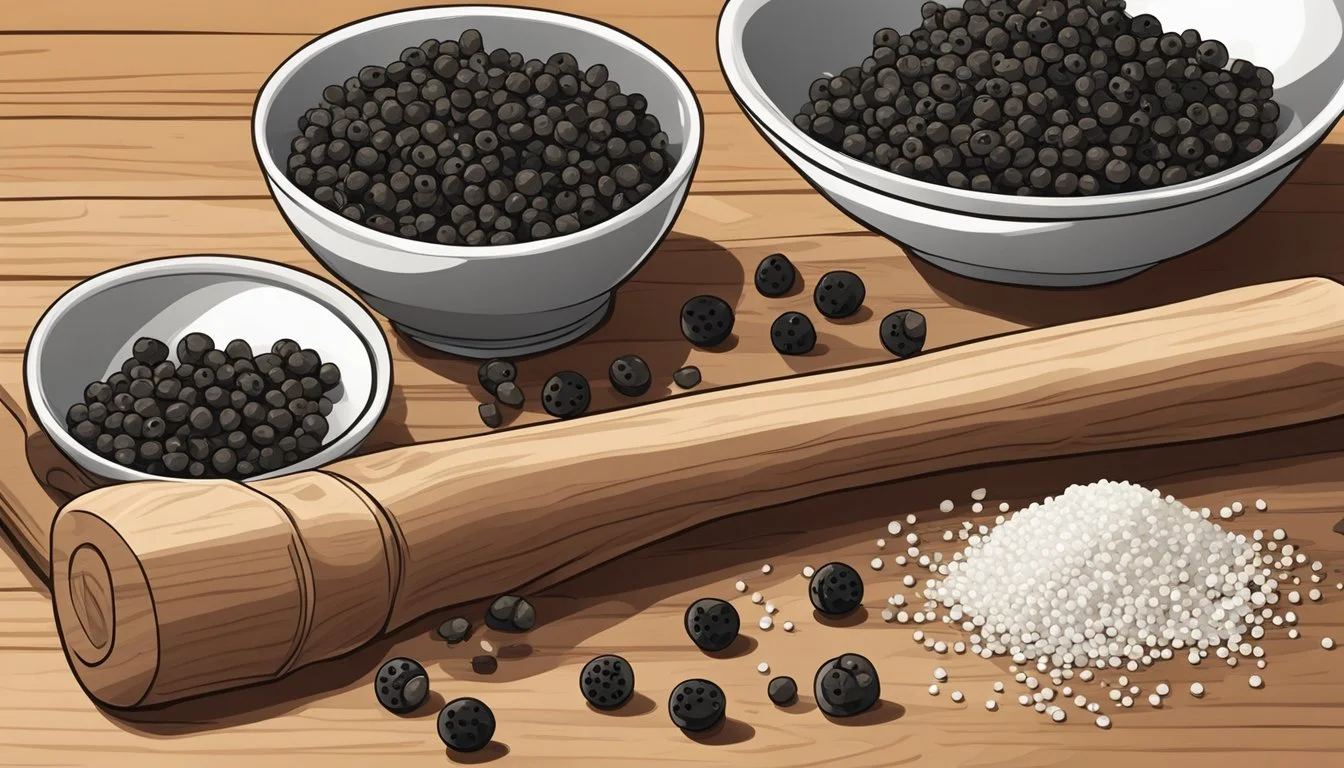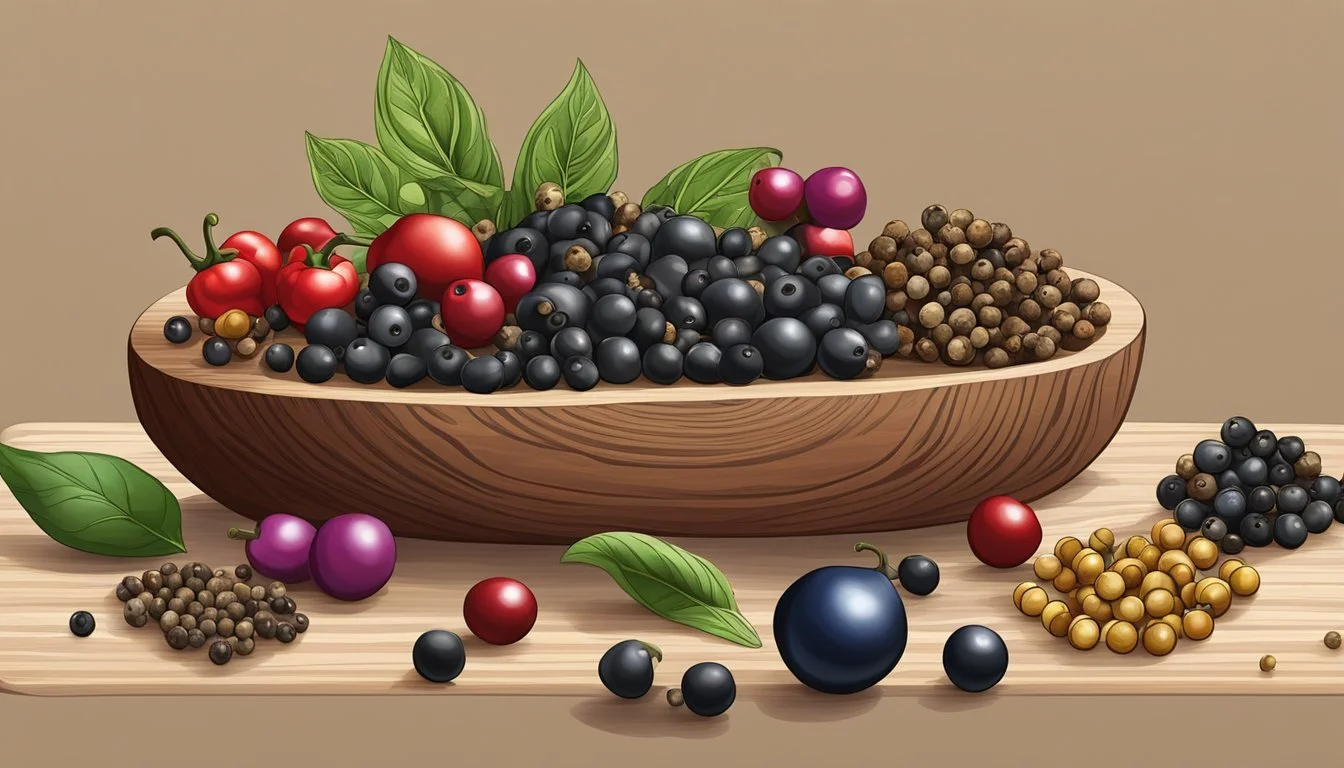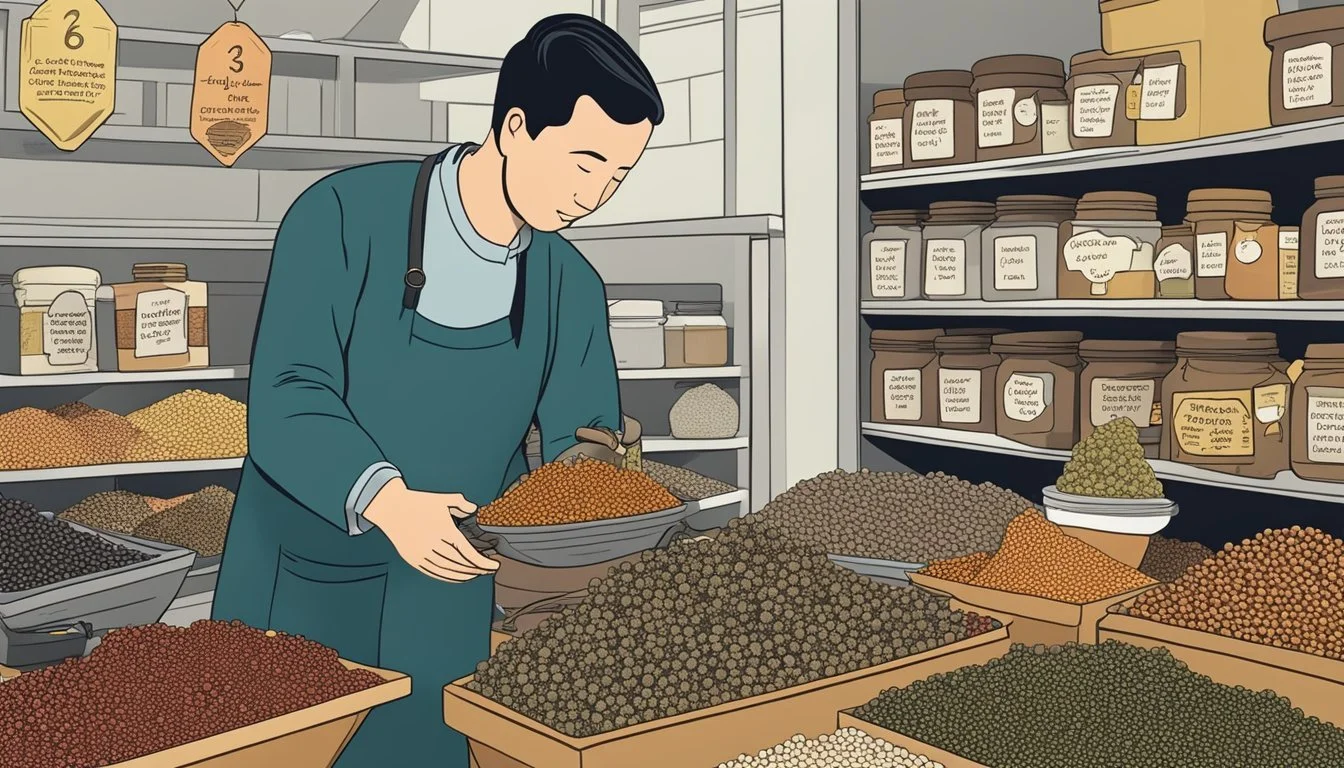Do Black Peppercorns Go Bad?
Shelf Life and Storage Tips
When diving into the world of spices, black peppercorns hold a place of honor in kitchens around the globe. These small, dark berries offer robust flavor and a hint of heat to countless dishes. Whole black peppercorns do not spoil or become unsafe to eat, but they can lose their flavor and aroma over time. This characteristic makes proper storage crucial for maintaining their freshness.
Stored in a cool, dry place away from sunlight, black peppercorns can retain their quality for around three to four years. The essential oils in peppercorns, responsible for their distinct aroma, gradually break down, leading to diminished potency. Moisture, heat, and light are the primary culprits for this degradation.
Signs that peppercorns may be past their prime include a loss of color, mold or mildew development, and changes in texture. By grinding fresh peppercorns as needed, one can enjoy the spice at its peak potency, ensuring that each dish is as flavorful as intended.
Understanding Peppercorns
Peppercorns are the dried fruits of the Piper nigrum plant. They come in several types, each offering unique flavors and culinary uses.
Black peppercorns are the most common variety. They are picked when almost ripe and sun-dried, causing the skin to turn dark and wrinkled. These have a sharp, pungent flavor.
White peppercorns are black peppercorns with their outer layer removed. This process leaves them with a milder taste, often described as sweet or floral.
Green peppercorns are harvested before they ripen. They can be used fresh, dried, or preserved in brine. The flavor is bright and somewhat grassy.
Red peppercorns are fully ripe berries from the same plant. They are less common and offer a sweeter, more complex flavor profile compared to black peppercorns.
Each type of peppercorn retains its flavor best when stored as whole peppercorns. This helps preserve their aroma and taste far longer than ground pepper.
Proper storage is key. Keeping them in a cool, dry, and dark place will prolong their shelf life. Airtight containers are recommended to maintain their quality.
Peppercorns provide a versatile seasoning option, lending themselves to a variety of dishes from different cuisines. Whether whole or ground, their presence in the kitchen is indispensable.
Shelf Life and Quality
Black peppercorns have a notable shelf life, retaining their essential oils and aromatic scent for several years if stored properly. Attention to storage conditions can extend their potency and quality.
Factors Affecting Shelf Life
Moisture is a primary factor that can reduce the longevity of black peppercorns. Exposure to humidity accelerates spoilage.
Sunlight and heat also deteriorate their quality. They should be kept in a cool, dark place to maintain freshness.
Proper storage in airtight containers prevents exposure to air and moisture, thus preserving the peppercorns' aroma and flavor. Avoid grinding until needed to maximize their potency.
Signs of Spoilage
Signs of spoilage in black peppercorns include a faded aroma and a less intense flavor. The color may also become dull.
Another indicator is the texture; spoiled peppercorns can become soft or mushy instead of hard and dry. If there's any mold or unusual odor, the peppercorns should be discarded.
Maximizing Peppercorn Potency
To achieve the best quality, avoid exposing black peppercorns to sunlight and heat. Store in a cool, dark place and use airtight containers.
Keeping whole peppercorns instead of ground ensures longer-lasting potency. Grind them only as needed to retain their vibrant flavor and aroma.
By following these practices, the shelf life of black peppercorns can be extended, ensuring they remain a valuable addition to your kitchen for years.
Storage Solutions
Proper storage of black peppercorns is essential to maintain their freshness and prolong their shelf life. Essential practices include keeping them in airtight containers, away from light, moisture, and heat sources.
Ideal Storage Conditions
Black peppercorns thrive when stored in a cool, dark place, such as a pantry or a dark cupboard. This environment helps preserve their essential oils and aromatic qualities. Avoid placing peppercorns near the stove or the sink to protect them from heat and moisture. Maintaining stable room temperature is crucial, as fluctuations can expedite the deterioration process.
Best Containers for Preservation
Airtight containers are crucial for preserving black peppercorns. These containers guard against air, moisture, and pests, which can all compromise quality. Glass jars with tight-sealing lids or plastic containers with snap-on tops are effective choices. For added protection, consider using vacuum-sealed bags, which eliminate air and further extend shelf life.
The Impact of Temperature and Light
Direct sunlight and excessive heat are detrimental to black peppercorns. They can break down the oils that give the peppercorns their flavor. Thus, storing peppercorns in a container can shield them from UV rays and high temperatures. Keeping them away from heat-producing appliances will also help maintain their potency and quality over time.
Long-Term Preservation Techniques
For even longer preservation, consider freezing the peppercorns. Freezing can halt the degradation of essential oils, ensuring the peppercorns remain aromatic and flavorful for extended periods. Use small, airtight containers or freezer bags to store the peppercorns and take out only what is needed. This prevents repeated thawing and refreezing, which can affect quality.
Proper Use in Cooking
Black peppercorns are a versatile spice that can enhance the flavor of many dishes. Their use in cooking spans various cuisines and techniques to unlock taste and aroma.
Unlocking Flavorful Potential
Using black peppercorns begins with selecting high-quality berries. These are typically black in color and have a fragrant, sharp aroma. Grinding them fresh with a pepper mill ensures the release of essential oils, resulting in a more impactful flavor.
Freshly ground peppercorns are ideal for seasoning dishes like steaks, salads, and pasta. This method retains the pungent flavor that is often lost in pre-ground pepper. Moreover, their aroma can enhance the sensory experience of eating. Black peppercorns are also effective in rubs and marinades, providing a deep, complex taste to meats and vegetables.
Appropriate Cooking Techniques
In cooking, whole black peppercorns are often added to sauces, soups, and stews. They lend a robust flavor when allowed to simmer, infusing the dish slowly. Crushing peppercorns with the flat side of a knife or using a mortar and pestle is useful for achieving varied textures and intensities in seasoning.
When sautéing or stir-frying, adding crushed peppercorns to the skillet early can allow their fragrance and flavor to bloom. This technique is beneficial in recipes requiring a more pronounced pepper taste.
For more delicate dishes, such as light sauces or dressings, using finely ground pepper ensures the seasoning evenly disperses without overpowering other flavors.
Distinguishing Types of Peppercorns
Peppercorns come in various types, primarily distinguished by their color and processing method. Each variety offers unique flavors and textures, suitable for different dishes and cuisines.
Characteristics of Different Varieties
Black Peppercorns: These are the most commonly used type, known for their sharp, pungent flavor. Black peppercorns are picked when almost ripe and then dried, which causes them to turn black.
White Peppercorns: These peppercorns have a milder flavor compared to black ones. They are black peppercorns with the outer layer removed, resulting in a slightly sweet, floral taste.
Green Peppercorns: These are immature berries that offer a bright, grassy flavor. They are often used whole or chopped in French cuisine and add a fresh, tangy taste to sauces and dressings.
Red Peppercorns: These are fully ripe berries from the Piper nigrum plant. They have a sweet and robust flavor but are less common and can be harder to find.
Pink Peppercorns: Not true peppercorns, these come from a variety of rose and are the dried berries of that plant. They have a delicate, sweet flavor and are quite rare.
Choosing the Right Type for Your Dish
Whole Black Peppercorns: Best for dishes that need a robust, spicy kick. Use them in meat rubs, soups, and stews to enhance flavor depth.
Ground Pepper: Convenient and quick to use, ground pepper can be used in almost any dish for a uniform, sharp flavor.
White Peppercorns: Ideal for light-colored sauces and soups where black flakes would be visually unappealing. They also work well in various Asian cuisines.
Green Peppercorns: These are perfect for adding a tangy zest to salads, salad dressings, and French sauces, especially those served with steak.
Red Peppercorns: Use them sparingly in gourmet dishes where their unique flavor can shine without overwhelming other ingredients. They pair well with sweet and savory flavors.
Pink Peppercorns: Due to their mild and slightly sweet flavor, they are perfect for delicate dishes and garnishes. They add a subtle twist to desserts and exotic dishes.
Health Benefits and Considerations
Including black peppercorns in one's diet can contribute various nutritional benefits and aid in digestion due to the presence of piperine. These factors highlight its importance in meals.
Nutritional Contributions of Peppercorns
Black peppercorns are rich in vitamins and minerals. They contain vitamin K, vitamin C, and vitamin E. Additionally, they are a good source of manganese, copper, calcium, and magnesium.
Piperine, the active compound found in black peppercorns, enhances the absorption of nutrients such as selenium, vitamin B12, and beta-carotene.
This makes black peppercorns an excellent addition for those looking to maximize the nutritional benefits of their food. Including peppercorns in daily meals supports maintaining healthy nutrient levels.
Potential Digestive Effects
Black peppercorns have significant impacts on digestion. Piperine stimulates the stomach to produce gastric acid, aiding in the digestion of food.
High levels of gastric acid can help reduce issues like bloating and indigestion. This makes black peppercorns beneficial for promoting smoother digestive processes.
Moreover, the antimicrobial properties of piperine help in maintaining a healthy gut flora. This can reduce the risk of gastrointestinal infections and support overall gut health.
By including black peppercorns, individuals can experience boosted digestive health and improved nutrient absorption.
Peppercorn Selection and Purchase Tips
Selecting the best black peppercorns involves evaluating freshness, quality, and understanding labels and grades to ensure optimal taste and longevity.
Checking for Freshness and Quality
Fresh peppercorns should have a strong, aromatic scent due to the essential oils they contain. Whole peppercorns maintain their quality longer than ground black pepper.
To test for freshness, rub a small quantity between your fingers; fresh peppercorns will release a vivid aroma. Look for even, dark-colored peppercorns without any signs of dullness or mold. Dried peppercorns should be hard but not brittle. Bulk purchasing should be approached with caution, ensuring that you can store them properly to maintain their quality.
Understanding Labels and Grades
Peppercorns come in various grades, often indicated on the packaging. Recognizable brands like McCormick provide detailed labeling with information about origins and quality standards.
When selecting, check for grades such as "Tellicherry," which signifies a higher quality peppercorn known for its robust flavor. Unopened packages with airtight seals will preserve the quality better than opened ones, which may require a pepper mill to retain their aroma and potency. Reading the label carefully will help you choose the right type for your requirements.
Maintenance and Care of Peppercorns
Proper storage and regular testing for freshness ensure your peppercorns remain flavorful. Equally important is caring for your grinders and mills to maintain optimal performance.
Regular Test for Freshness
Even though whole black peppercorns can last 3 to 4 years if stored correctly, it's essential to occasionally check their freshness. To test, crush a few peppercorns and smell them. Fresh peppercorns should have a strong, unmistakable aroma and robust flavor.
Store peppercorns in containers with tight-fitting lids to limit exposure to air and humidity. Resealable plastic bags or glass jars with rubber gaskets are ideal. Keep them in a cool, dark place to avoid light and heat, which can degrade quality. Avoid leaving peppercorns uncapped for extended periods to reduce the risk of losing potency.
Cleaning and Care for Grinders and Mills
Regularly cleaning your pepper mill is crucial for maintaining its efficiency. Firstly, disassemble the mill if possible. Use a small brush to remove residual pepper and oils that can accumulate over time. A gentle soap solution can be used to clean the internal parts, but ensure everything is thoroughly dried before reassembly to prevent moisture issues.
Avoid overfilling the grinder to prevent jamming and ensure smooth operation. Using dried peppercorns instead of pre-ground pepper is recommended, as ground pepper can leave sticky oils that lead to congestion. If your mill has a metal grinding mechanism, occasional light oiling can keep it running smoothly. For mills with plastic parts, focus on keeping them clean and dry.
Troubleshooting Common Pepper Problems
Mold, mildew, and improper storage can affect the quality of your black peppercorns. Addressing these issues promptly will ensure that your peppercorns stay fresh and flavorful.
Dealing with Mold and Mildew
Mold and mildew can develop on peppercorns if they are stored in damp or humid conditions.
Inspect the peppercorns for any signs of mold or mildew, such as fuzzy growth or a musty smell.
If only a few peppercorns are affected, remove and discard them. Clean the storage container with soap and water, and dry it completely before refilling.
To prevent future mold and mildew, store peppercorns in a cool, dry place with low humidity. Use airtight containers to minimize exposure to moisture.
Restoring Damp or Clumped Peppercorns
Damp peppercorns can clump together, making them difficult to use.
To restore them, spread the peppercorns out on a baking sheet in a single layer. Dry them in an oven at a low temperature (around 200°F or 93°C) for 20-30 minutes, stirring occasionally.
Allow the peppercorns to cool completely before transferring them to an airtight container.
Avoid storing peppercorns near the stove or other sources of heat and moisture to prevent clumping.









